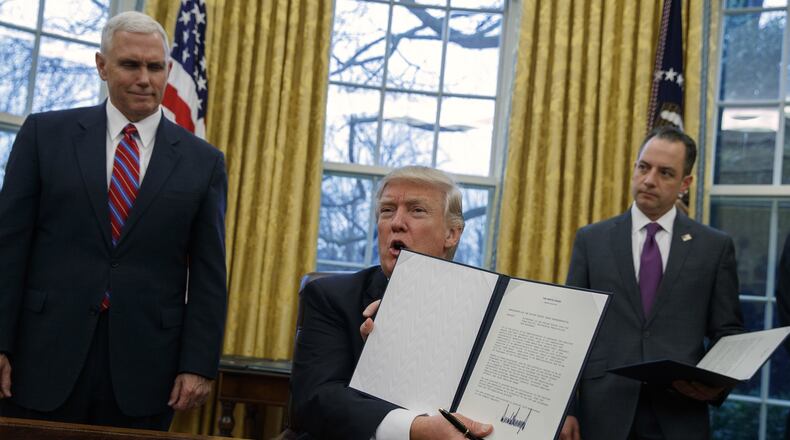President Donald Trump on Sunday issued a statement defending his controversial executive order restricting immigration and refugee resettlements, denying it is a "Muslim ban" and taking aim at the news media.
“America is a proud nation of immigrants and we will continue to show compassion to those fleeing oppression, but we will do so while protecting our own citizens and border,” he said in his one-paragraph statement. “America has always been the land of the free and home of the brave. We will keep it free and keep it safe, as the media knows, but refuses to say.”
“To be clear, this is not a Muslim ban, as the media is falsely reporting,” he continued. “This is not about religion — this is about terror and keeping our country safe.”
Trump's order sparked a federal lawsuit and caused massive confusion at the nation's airports this weekend. The order — parts of which were put on hold Saturday night by a federal judge in New York — bars people from seven predominantly Muslim countries from entering the U.S. for three months: Iraq, Syria, Iran, Sudan, Libya, Somalia and Yemen.
It also bars any refugees from resettling in the U.S. for four months. And it indefinitely blocks Syrian refugees from resettling here. Further, it caps the number of any refugees who could be resettled here this fiscal year at 50,000, down from the 110,000 ceiling set by the Obama administration.
“There are over 40 different countries worldwide that are majority Muslim that are not affected by this order,” Trump said. “We will again be issuing visas to all countries once we are sure we have reviewed and implemented the most secure policies over the next 90 days.
“I have tremendous feeling for the people involved in this horrific humanitarian crisis in Syria. My first priority will always be to protect and serve our country, but as president I will find ways to help all those who are suffering.”
Late Saturday night, U.S. District Court Judge Ann Donnelly halted parts of Trump’s order, stopping the government from removing refugees approved by the government, people with valid immigrant and non-immigrant visas and others from Iraq, Syria, Iran, Sudan, Libya, Somalia, and Yemen.
About the Author





